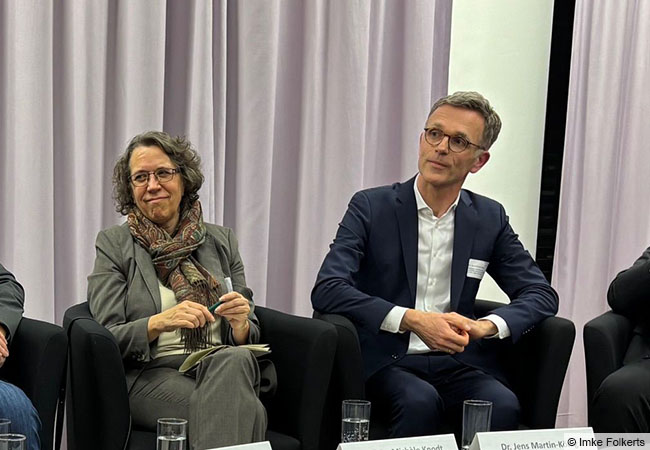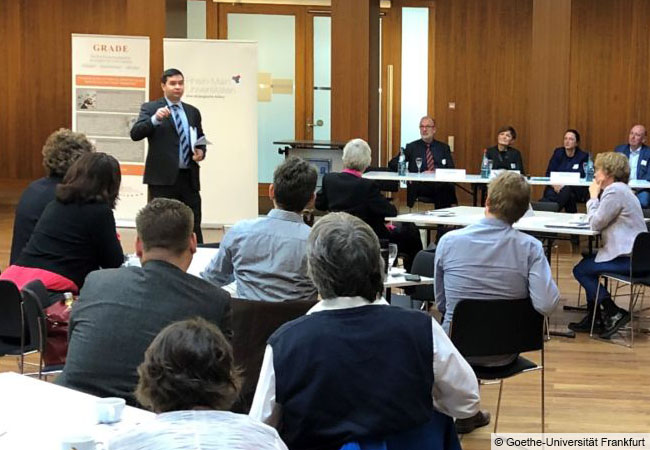When Korean pop bands such as boy group BTS reach millions of fans worldwide, and when films and music from Nigeria are seen and heard across the globe: What does this mean for the production of culture? And how does it affect our perception of cultural spaces? An interdisciplinary research team that brings together Economics, African Studies, Korean Studies, Sinology, Cultural Anthropology and Film Studies will look for answers to these questions at Goethe University Frankfurt and Johannes Gutenberg University Mainz over the next three years. With € 2.1 million in funding from Germany’s Federal Ministry of Education and Research (BMBF), CEDITRAA (“Cultural Entrepreneurship and Digital Transformation in Africa and Asia”) will study the emergence of what Pakistani writer Fatima Bhutto calls the “new world order of cultural production”, which Hollywood and Europe no longer dominate.
In the early 1990s, Kenneth Nnebue, a Nigerian seller of home video equipment, picked up his VHS camera and changed the course of film history. To boost sales of VHS recorders, he produced his own film. “Living in Bondage” sold around 750,000 copies and spawned numerous imitations. Practically out of nowhere, Nigeria built up a film industry with global outreach, now popularly known as “Nollywood”, which today ranks second only to India in terms of annual film output. “The rise of Nigeria and the global success of Korean films, TV dramas and pop music in the new millennium show that a fundamental shift is taking place in cultural production and reception across the globe,” says Vinzenz Hediger, project leader and professor of cinema studies at Goethe University.
Digitalisation is one of the driving forces behind this transformation and the emergence of the “new world order of cultural production”. The researchers in Frankfurt and Mainz will study how cultural industries with transregional audiences contribute to the economic growth and soft power of their regions and countries of origin. They will also examine the role of regional resources in the creative work of artists in music and film. “One open question,” says economics professor Cornelia Storz, “is whether entrepreneurs in digital industries may, in fact, be more dependent on local resources than their global reach and outlook might suggest.” Particular attention will be paid to how producers in music and film draw on cultural heritage to produce innovative formats which resonate with larger, global contexts.
The CEDITRAA research group will address these issues through a series of case studies on music and film in Africa and Asia. Here, the Archiv der Musik Afrikas (AMA), the Archive for the Music of Africa, at Johannes Gutenberg University Mainz will play a particularly important role. For the case studies dedicated to music and copyright issues, the AMA is an invaluable resource – particularly for research on “Afrobeats” and other forms of sub-Saharan pop music, which recombines different gernes in innovative new ways. “This music has many fans in the Global North as well,” says Matthias Krings, professor of cultural anthropology and the popular culture of Africa in Mainz. “Among them is Beyoncé, who created a sensation with her 2020 album ‘Black Is King’, not least because it featured guest appearances by Afrobeats stars such as Burna Boy, Wizkid, Tiwa Savage and Yemi Alade.”
The parts of the project dedicated to Asia will study the circulation and reception of Korean popular culture in Asia and Africa and benefit from close collaboration with non-university partners such as the Korean Film Archive. The case study dedicated to Taiwan will focus on the Kaohsiung Film Festival and its close ties to the Korean film industry. In Nigeria, the project will collaborate closely with the Nollywood Studies Centre at the Pan-Atlantic University in Lagos, a research institute with closes ties to the film and music industries in Nigeria. The Nigerian part of the project will include a PhD position at the Pan-Atlantic University.
Funded by Germany’s Federal Ministry of Education and Research, the project will bring together for the first time the area studies research centres in the Rhine-Main University Alliance in a joint research initiative – the Centre for Interdisciplinary African Studies (ZIAF) and the Interdisciplinary Centre for East Asian Studies (IZO) at Goethe University and the Centre for Intercultural Studies (ZIS) at Johannes Gutenberg University Mainz.
The research project enhances the profile of area studies in the Rhine-Main University Alliance through its close connection to teaching. Project results will be used in teaching in several degree programmes, most notably the bachelor’s degree programme “African Languages, Media, and Culture”, which is being prepared as a joint programme of Goethe University Frankfurt and Johannes Gutenberg University Mainz.








